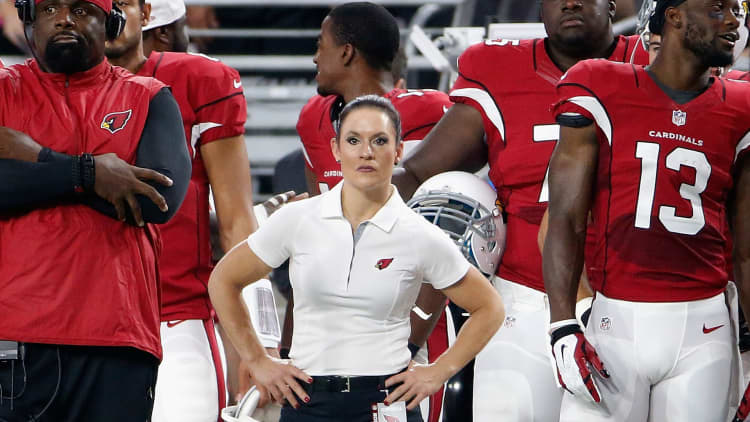Jenny Ming launched and ran the all-American brand Old Navy and now leads Charlotte Russe. She has been named one of the most powerful women in American business by Fortune and one of the nation's top managers by Businessweek.
But she didn't start out as the prototypical CEO. She grew up as the shy Chinese girl in San Francisco's Chinatown, named "Most Bashful" in high school. Once a manager told her she would "never make it in this business because you are such a pushover."
How did she make the leap from overlooked to high-powered retail executive? Ming tells CNBC Make It that the key to her success, and other women's, comes down to a fundamental rule: "Never underestimate yourself."
Ming immigrated to the U.S. from Canton, China, with her parents at age 9, and graduated from San Jose State University with a bachelor's degree in clothing merchandising and marketing in 1978.
Her first job after college was as a management trainee at Mervyn's store in Daly City, California. Ming says she wasn't a savvy manager in the beginning. The part-time sales associates were mostly middle-aged housewives, she says, who would frequently chit-chat and take long breaks. They treated Ming like a daughter, but not like a boss.
When Ming's supervisor told her she would never make it, she said to herself, "I can't give up. It's only my first month on the job."
Ming went to have a heart-to-heart with the sales associates. "I'm probably going to get fired," she told them. "And then you are going to get a new boss, and they are probably going to be much, much harder on you than I am."
Surprised by her candor, the associates asked Ming what they could do to keep her as a manager. Ming laid out the ground rules and the staff followed through.
"I learned that you can be assertive even when you are just starting out," she says.
Eventually Ming became a top retail buyer in San Francisco, and in 1989, she received a call from Gap Inc CEO Mickey Drexler. "He said one of his good friends recommended me and said I was one of the best buyers he knew," she recalls. She interviewed with Drexler directly and joined Gap as a merchandise manager.
Ming learned another hard lesson on the importance of never undervaluing yourself when she was at Gap.
Ming and three other colleagues launched Old Navy in 1994. As employee No. 1, she helped fine-tune the "industrial chic" look and established its unique value proposition as affordable and trend-setting.
It worked. Sales from Old Navy stores rivaled those from parent company Gap, and the brand expanded to more than 500 stores nationwide by 1999.
Drexler asked Ming if she wanted to be the president of Old Navy. "I turned it down," Ming says. "I said to him, 'I have the best job in the world as the head of merchandising.'"
In reality, she says she didn't want to risk ruining the success she had created together with her team. She thought to herself: "How would my peers feel if I became president? I didn't want to rock the boat."
So Drexler started interviewing candidates for the role, and he would introduce them to Ming. Every time she met a potential candidate, she said to herself, "Gosh, how do I feel if this person becomes my boss, after all the hard work I had done?"
A year later, Ming finally told Drexler that she wanted the job. He started laughing and said, "I've been waiting for you to realize this for a year."
Under her management, Old Navy expanded to 900 stores and grew to a $6.7 billion business for Gap Inc. In 2009, she joined Charlotte Russe as CEO, overseeing 545 stores in the U.S. and Puerto Rico.
Ming says women sometimes have a tendency to avoid rocking the boat when everything is going well, "but that's preventing you from rising to the next level."
While many men might think they could do the job even when they are not ready, a lot of women only realize they can do the job when someone else tells them so. "I learned to push myself," she says.
Being a female minority in an executive role requires even more self-confidence, Ming notes.
In some ways, "it's an advantage to be a woman and Chinese, because if I am in a room, people remember me," she says. "But it's also because I am a Chinese-American woman that most people underestimate that. So you have to prove them wrong."
One time a peer said to her, "I didn't know you could make tough decisions because you look so sweet and nice." Ming told him that actually, it's easy to make tough decisions when you have the facts in front of you.
Now a proud mother of three and a member of prominent Chinese-American organization Committee 100, Ming stresses the importance of being comfortable in your own skin and knowing your value. And when opportunity knocks, "you have to make sure you get up there" and answer.
Like this story? Like CNBC Make It on Facebook!
Don't miss: How self-made millionaire Barbara Corcoran prioritizes her huge to-do list



